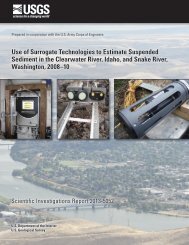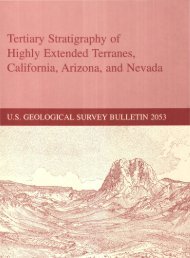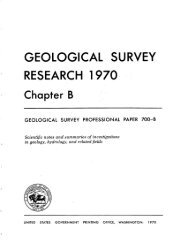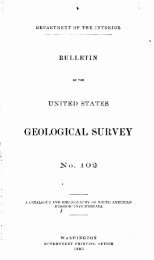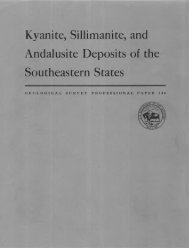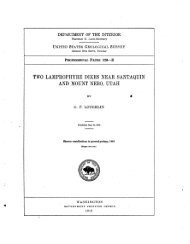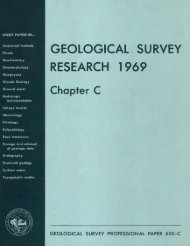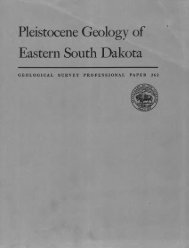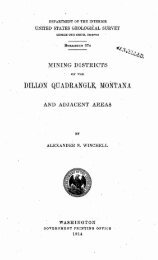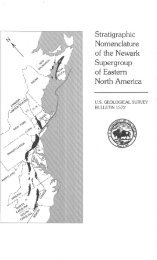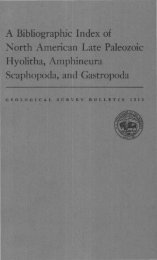Geophysical Abstracts 152 January-March 1953
Geophysical Abstracts 152 January-March 1953
Geophysical Abstracts 152 January-March 1953
Create successful ePaper yourself
Turn your PDF publications into a flip-book with our unique Google optimized e-Paper software.
48 GEOPHYSICAL ABSTRACTS <strong>152</strong>, JANUARY-MARCH <strong>1953</strong><br />
Within certain limitations, the variations in radioactivity of the litttes&mes<br />
appear to be the dominant factor in the cause of variations in therm^lumines-<br />
cence. Author's Abstract<br />
HEAT<br />
GENERAL AND THEORETICAL STUDIES<br />
14345. Lapwood, E. R. The effect of contraction in the cooling by conduction of<br />
a gravitating sphere, with special reference to the Earth: Royal Astron.<br />
Soc. Monthly Notices, Geophys. supp., v. 6, p. 402-407, 1952.<br />
The equation of heat conduction is given for a contracting, gravitating sphere.<br />
An associated energy equation is interpreted in terms of interchanges of gravi<br />
tational potential, strain, and heat energy. The heat equation is applied to the<br />
case of the earth, and with some simplifications it has been solved by the method<br />
of successive approximations. Three conclusions are offered: It is pnofe^ble<br />
that the heating effect of contraction is more than counteracted by the speedier<br />
outflow of heat due to increased temperature gradients. It is probable that the<br />
corrections demanded by departures of the earth's crust from homogeneity as<br />
regards density, specific heat, and thermal conductivity are larger than those<br />
that allow for contraction. None of these effects is large enough to make funda<br />
mental changes in the picture of the earth's thermal history that is derived from<br />
discussion of the cooling of a rigid uniform sphere, with allowance for radio<br />
activity. P. E. B.<br />
14346. Chandrasekhar, S. The thermal instability of a fluid sphere heated<br />
within: Philos. Mag., v. 43, no. 347, p. 1317-1329, 1952.<br />
In this paper the problem of the thermal instability of an incompressible<br />
fluid sphere heated within and in equilibrium under its own gravitation is<br />
considered. A general disturbance is analysed into modes in terms of spherical<br />
harmonics of various orders, I, and the criterion for the onset of convection for<br />
the first fifteen modes is found both when the bounding surface is free and<br />
when it is rigid; and it is shown that in both cases the mode 1=1 is the first<br />
to be excited. Author's Abstract<br />
14347. Chandrasekhar, S. The onset of convection by thermal instability iu<br />
spherical shells: Philos. Mag., v. 44, no. 350, p. 233-241, <strong>1953</strong>.<br />
In this paper the problem of the thermal instability of an incompressible<br />
sphere consisting of an inviscid core and a viscous mantle is considered, and it<br />
is shown that the pattern of convection which sets in, at marginal stability, in<br />
the mantle shifts to harmonics of the higher orders as the thickness of the<br />
mantle decreases. Thus, when the mantle extends to a depth of half the radius<br />
of the sphere, the harmonics of orders three and four set in about simultaneously,<br />
while the harmonic of order five follows very soon afterwards. The bearing of<br />
this result on the problem of convection in the earth's mantle and of the inter<br />
pretation of the earth's topographic features is indicated. Author's Abstract<br />
14348. Urey, H. C. Comments on planetary convection as applied to the earth:<br />
Philos. Mag., v. 44, no. 349, p. 227-230, <strong>1953</strong>.<br />
Chandrasekhar has shown that first order spherical harmonic convection in<br />
a sphere can occur if the sphere has a liquid core with a diameter not larger<br />
than 18 percent of the sphere diameter. Successively higher harmonies appear



